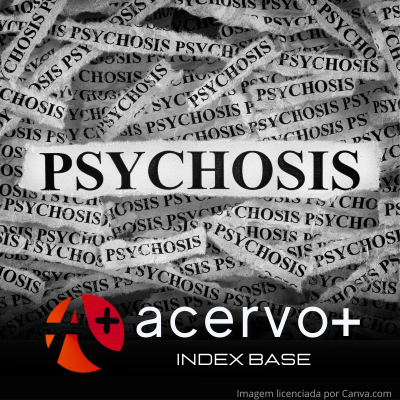Manejo clínico da psicose durante a perinatalidade
##plugins.themes.bootstrap3.article.main##
Resumo
Objetivo: Identificar as abordagens terapêuticas para o manejo da psicose em mulheres durante a gestação e o puerpério. Métodos: Revisão integrativa da literatura nas bases de dados SciELO, MedLine (via PubMed) e LILACS. Foram incluídos artigos dos últimos cinco anos, que apresentaram abordagens clínicas sobre a temática. Estudos que não especificaram a inclusão de mulheres durante a perinatalidade foram excluídos. A busca foi realizada por meio dos descritores "Psychotic Disorders", "Perinatal Care", "Pregnant Women" e "Postpartum Period". Resultados: Foram incluídos no estudo sete artigos acerca do manejo da psicose durante a perinatalidade. As evidências destacaram a importância da triagem na psicose durante o período perinatal, enfatizando a abordagem multiprofissional. O lítio é indicado como tratamento principal, com ECT para casos graves. Durante a gestação, o monitoramento sérico é crucial. Questiona-se a internação em enfermarias convencionais, priorizando o manejo centrado na paciente e no suporte às famílias. Considerações finais: Destaca-se a urgência de abordagens integradas, sensíveis e preventivas para assegurar o bem-estar psicológico durante a gravidez e o puerpério. A escassez de informações ressalta a necessidade crucial de pesquisas para aprimorar estratégias de intervenção e suporte adequado às mulheres nesse período delicado.
##plugins.themes.bootstrap3.article.details##
Copyright © | Todos os direitos reservados.
A revista detém os direitos autorais exclusivos de publicação deste artigo nos termos da lei 9610/98.
Reprodução parcial
É livre o uso de partes do texto, figuras e questionário do artigo, sendo obrigatória a citação dos autores e revista.
Reprodução total
É expressamente proibida, devendo ser autorizada pela revista.
Referências
2. BRASIL. Lei Nº 14.721, de 8 de novembro de 2023. Altera os arts. 8º e 10º da Lei nº 8.069, de 13 de julho de 1990 (Estatuto da Criança e do Adolescente), para ampliar a assistência à gestante e à mãe no período da gravidez, do pré-natal e do puerpério. Brasília, DF: Diário Oficial da União, 2023.
3. FORDE R, et al. Psychological interventions for managing postpartum psychosis: A qualitative analysis of women’s and family members’ experiences and preferences. BMC Psychiatry, 2019; 19(1): 411.
4. FORDE R, et al. Recovery from postpartum psychosis: a systematic review and metasynthesis of women’s and families’ experiences. Archives of Women's Mental Health, 2020; 23: 597-612.
5. FORNARO M, et al. Lithium exposure during pregnancy and the postpartum period: A systematic review and meta-analysis of safety and efficacy outcomes. The American journal of psychiatry, 2020; 177(1): 76–92.
6. FRIEDMAN SH, et al. Postpartum psychosis. Current psychiatry reports, 2023; 25(2): 65–72.
7. GILDEN J, et al. Mother-to-infant bonding in women with postpartum psychosis and severe postpartum depression: a clinical cohort study. Journal of Clinical Medicine, 2020; 9(7): 2291.
8. GONZÁLEZ-RODRÍGUEZ A. e SEEMAN MV. The association between hormones and antipsychotic use: a focus on postpartum and menopausal women. Therapeutic advances in psychopharmacology, 2019; 9: 2045125319859973.
9. GROVER S, et al. ECT in the postpartum period: a retrospective case series from a tertiary health care center in India, 2018; 40(6): 562-567.
10. HAUGE C, et al. Treatment of postpartum psychotic‐ or mood disorder requiring admission: A nationwide study from Denmark. Acta psychiatrica Scandinavica, 2023; 147: 1–9.
11. HENRIQUES-CALADO J, et al. Psychotic spectrum features in borderline and bipolar disorders within the scope of the DSM-5 section III personality traits: a case control study. Borderline personality disorder and emotion dysregulation, 2023; 10(1).
12. MAYERS A, et al. Supporting women who develop poor postnatal mental health: what support do fathers receive to support their partner and their own mental health? BMC Pregnancy and Childbirth, 2020, 20(1): 1-9.
13. MCCLEERY A e NUECHTERLEIN KH. Cognitive impairment in psychotic illness: prevalence, profile of impairment, developmental course, and treatment considerations. Dialogues in clinical neuroscience, 2019; 21(3): 239–248.
14. ORTEGA MA, et al. A review: Integrative perspectives on the features and clinical management of psychotic episodes in pregnancy. Journal of clinical medicine, 2023; 12(2): 656.
15. OSBORNE LM. Recognizing and managing postpartum psychosis: A clinical guide for obstetric providers. Obstetrics and gynecology clinics of North America,2018; 45(3): 455-468.
16. PERRY A, et al. Phenomenology, epidemiology and aetiology of postpartum psychosis: A review. Brain sciences,2021; 11(1): 47.
17. RODRIGUEZ-CABEZAS L. e CLARK C. Psychiatric emergencies in pregnancy and postpartum. Clinical obstetrics and gynecology, 2018; 61(3): 615–627.
18. RÖNNQVIST I. et al. Rehospitalization of postpartum depression and psychosis after Electroconvulsive therapy: A population-based study with a matched control group. The journal of ECT, 2019; 35(4): 264-271.
19. ROXBURGH E, et al. Experiences of mental health care among women treated for postpartum psychosis in England: A qualitative study. Community mental health journal, 2023; 59(2): 243–252.
20. RUNDGREN S, et al. Improvement of postpartum depression and psychosis after electroconvulsive therapy: A population-based study with a matched comparison group. Journal of affective disorders, 2018; 235: 258-264.
21. SCHORETSANITIS G, et al. Blood levels to optimize antipsychotic treatment in clinical practice: A joint consensus statement of the American society of clinical psychopharmacology and the therapeutic drug monitoring task force of the Arbeitsgemeinschaft für neuropsychopharmakologie und pharmakopsychiatrie. The journal of clinical psychiatry, 2020;81(3).
22. YADAWAD V, et al. Short-term outcome of mothers with severe mental illness admitted to a mother baby unit. Indian J Psychiatry, 2021; 63(3): 245-249.

